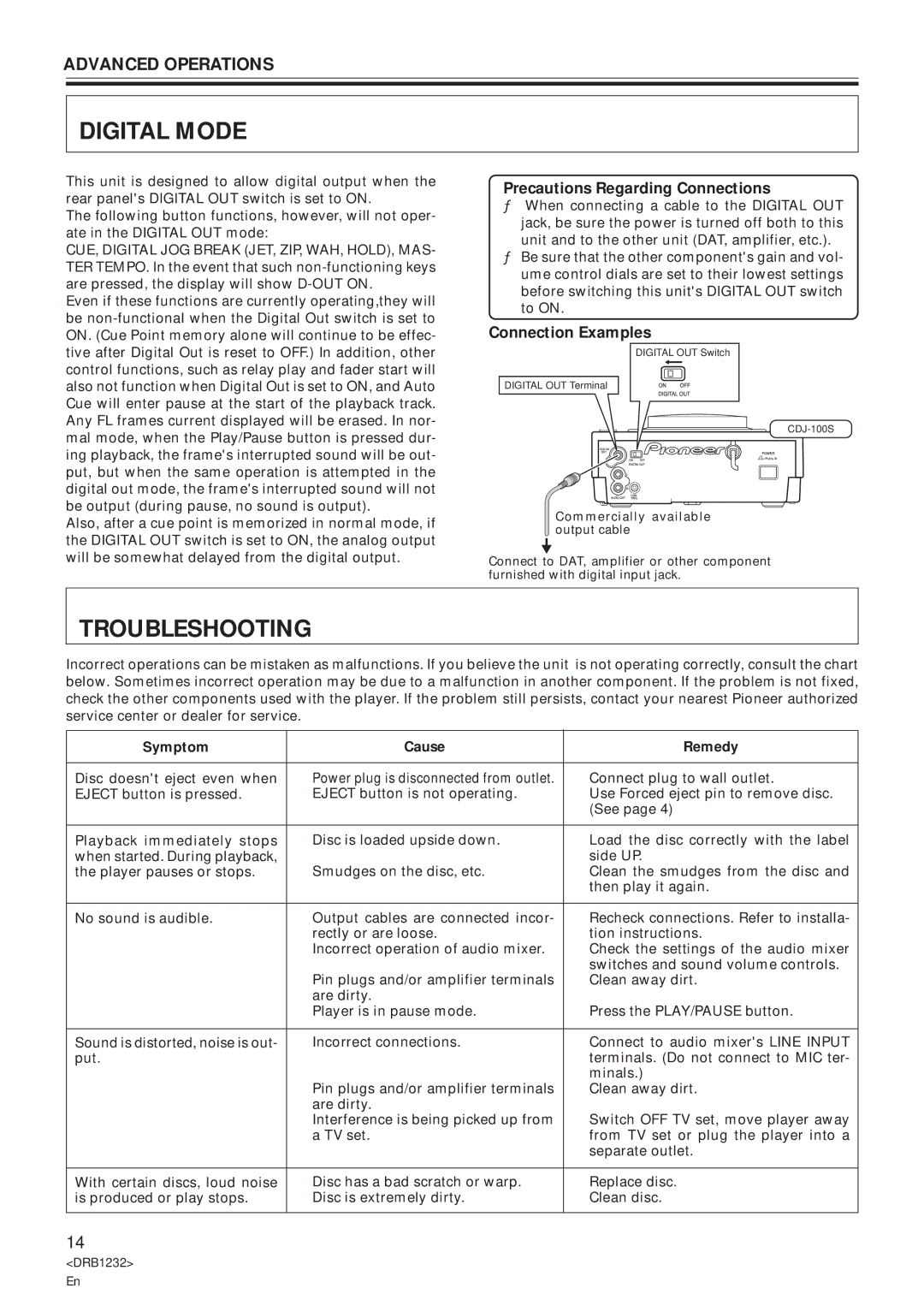
ADVANCED OPERATIONS
DIGITAL MODE
This unit is designed to allow digital output when the rear panel's DIGITAL OUT switch is set to ON.
The following button functions, however, will not oper- ate in the DIGITAL OUT mode:
CUE, DIGITAL JOG BREAK (JET, ZIP, WAH, HOLD), MAS- TER TEMPO. In the event that such
Even if these functions are currently operating,they will be
Also, after a cue point is memorized in normal mode, if the DIGITAL OUT switch is set to ON, the analog output will be somewhat delayed from the digital output.
Precautions Regarding Connections
¦When connecting a cable to the DIGITAL OUT jack, be sure the power is turned off both to this unit and to the other unit (DAT, amplifier, etc.).
¦Be sure that the other component's gain and vol- ume control dials are set to their lowest settings before switching this unit's DIGITAL OUT switch to ON.
Connection Examples
DIGITAL OUT Switch
DIGITAL OUT Terminal
Commercially available output cable
Connect to DAT, amplifier or other component furnished with digital input jack.
TROUBLESHOOTING
Incorrect operations can be mistaken as malfunctions. If you believe the unit is not operating correctly, consult the chart below. Sometimes incorrect operation may be due to a malfunction in another component. If the problem is not fixed, check the other components used with the player. If the problem still persists, contact your nearest Pioneer authorized service center or dealer for service.
Symptom |
| Cause |
| Remedy |
|
|
| ||
Disc doesn't eject even when | Ö Power plug is disconnected from outlet. | Ö Connect plug to wall outlet. | ||
EJECT button is pressed. | Ö | EJECT button is not operating. | Ö Use Forced eject pin to remove disc. | |
|
|
|
| (See page 4) |
|
|
|
|
|
Playback immediately stops | Ö | Disc is loaded upside down. | Ö | Load the disc correctly with the label |
when started. During playback, | Ö | Smudges on the disc, etc. | Ö | side UP. |
the player pauses or stops. | Clean the smudges from the disc and | |||
|
|
|
| then play it again. |
|
|
|
|
|
No sound is audible. | Ö | Output cables are connected incor- | Ö | Recheck connections. Refer to installa- |
|
| rectly or are loose. | Ö | tion instructions. |
| Ö Incorrect operation of audio mixer. | Check the settings of the audio mixer | ||
| Ö Pin plugs and/or amplifier terminals | Ö | switches and sound volume controls. | |
| Clean away dirt. | |||
|
| are dirty. | Ö Press the PLAY/PAUSE button. | |
| Ö Player is in pause mode. | |||
|
|
|
|
|
Sound is distorted, noise is out- | Ö | Incorrect connections. | Ö | Connect to audio mixer's LINE INPUT |
put. |
|
|
| terminals. (Do not connect to MIC ter- |
| Ö Pin plugs and/or amplifier terminals | Ö | minals.) | |
| Clean away dirt. | |||
|
| are dirty. | Ö |
|
| Ö Interference is being picked up from | Switch OFF TV set, move player away | ||
|
| a TV set. |
| from TV set or plug the player into a |
|
|
|
| separate outlet. |
|
|
|
| |
With certain discs, loud noise | Ö Disc has a bad scratch or warp. | Ö | Replace disc. | |
is produced or play stops. | Ö Disc is extremely dirty. | Ö | Clean disc. | |
|
|
|
|
|
14
<DRB1232>
En
